The Thule Society
Monument to Rahn in Burg Waldeck (Hunsrück). Rahn and Wandervogel
V.: I have a question. Richard mentions the monument to Otto in the forest of the Hunsruck. Have anyone some pictures? Or the precise coordinates? I have not found any mentions about.
By the way - I don't like the inscription on it “Caution – these ways lead astray!”
It's not so simple)
Richard Stanley: Ave V. - You are right, mon frere. It is not so simple! The monument is a round stone bank in the courtyard of the seat of the Nerother Bund, a deeply conservative branch of the German youth movement known as the 'Wandervogel' whose headquarters can be found in Burg Waldeck in the forest of Hunsruck. As far as I know there are no photographs available on the web of this curious construction.
White Lie by Jeanne D'Aout, scene with Otto
“The nightmare was complete when I couldn’t even prove I was a pure blood Aryan, because when I researched my genealogy, I realised my mother and maternal grandfather were Jewish. And I must admit, I was a trouble-maker, I got into fights a lot when I saw SS soldiers misbehave and I wanted to make a career, to move further up the ladder. I was attracted by the power of my superiors, like many others, and in this process I gained a few political enemies. This is how my reputation attracted Hitler’s attention. He demanded my presence at the Berghof, Hitler’s base near Bergtesgaden on the German-Austrian border. I can still remember him, sitting behind his desk, wearing his reading glasses while reading my file. I had never seen him with reading glasses before. While Hitler was reading my file I waited for his reaction. My legs nearly gave way. Then he gave me my new orders, which said that I was drafted to be trained as a soldier, “to make a man out of me”, he said, so I took the journey to Buchenwald…”
Otto started to tremble again.
Otto Rahn y la Búsqueda Nazi por el Secreto de los Cátaros
La Berlin de entreguerras era una ciudad conocida en toda Europa por su sub-cultura bohemia y sus jovenes intelectuales. Entre los personajes que ardientemente celebraban los abundantes «ismos» que estaban fracturando las viejas certezas ideologicas, las cuales habian compactado el siglo XIX, pocos individuos eran mas coloridos que un joven de ojos verdes y cabellos oscuros llamado Otto Rahn. Su figura delgada, envuelta en un caracteristico abrigo negro y sombrero tiroles, arrojaba una larga sombra desde esos anos sombrios, una «gran silueta» alrededor de la cual se han acumulado los mitos mas extravagantes. El fue considerado igualmente como mason, rosacruz, luciferino, y un agente de la Sociedad Thule. Como lo plantea el autor Phillip Kerr, los contemporaneos de Rahn no se habrian sorprendido de ver «la Dama Escarlata y la Gran Bestia salir volando desde la puerta del frente» de su apartamento en Tiergartenstrasse. Uno de sus companeros de la Orden Negra de Heinrich Himmler comento en un memorandum interno que el «medio sospechaba que Rahn tenia relaciones con el pueblo pequeno».
Lachrymae, Chapter IV: The Final Chapter
An Online Journal by Richard Stanley<
(Originally appeared in R. S.' MySpace<, December 9th, 2007.)
Brethren, I have invited you here to this ancient, invisible theatre with the intention of not only unmasking the killer God responsible for these crimes against 'reality', but more cogently, to provide an unambiguous solution to two or perhaps three long running esoteric enigmas!
I salute those who have stayed with the program from the top. For late joiners I include an index to conjure order out of the scrolling chaos and serve as an aid memoir for those hardy few who dare read further. I have very little keyboard time at present and less in the months to come. Until we meet again this strange saga is my gift to you.
Be warned the completed text contains 'spoilers' and may be hazardous to your belief systems.
White Lie by Jeanne D'Aout
The Secret of Otto Rahn - Relic Hunter
The nineteen thirties, Nazi Germany. Organisations like the Nordische Gesellschaft and the Thule Gesellschaft were researching the origin of the Germanic people, the Arian race. Obsessed with the ancient cultures which connected their ancestors, they searched all corners of the earth trying to find relics and remains of these old civilizations. Relic hunter Otto Rahn seached for the Grail treasure. Here, in Occitania.
Rahn visited Occitania many times and stayed for months at the time during 1929 - 1932. In '32 he leased a hotel called 'Les Maronniers' in Ussat-les-Bains. On the photo we see him entertaining his mother in the garden of the hotel. He is wearing a sweater which his mum nitted for him, showing the symbol of the Thule Gesell-schaft of which he was a member. When the hotel went bankrupt, he had to leave France.
Otto Rahn: author, poet, Grail seeker, SS officer
In February 2007, Montserrat Rico Góngora published “The Desecrated Abbey”, in which he claimed that Heinrich Himmler, Hitler’s second-in-command and head of the Nazi SS, had made a secret wartime mission to an abbey in Spain, in search of the Holy Grail. Góngora even interviewed Andreu Ripol Noble, a former monk and the only person that spoke German, who was ordered by his superiors to guide Himmler during the visit in 1940. Ripol related that Himmler came to Montserrat inspired by Richard Wagner’s opera “Parsifal”, which mentions that the Holy Grail could be kept in “the marvellous castle of Montsalvat in the Pyrenees” – the mountain range that marks the border between France and Spain.
Otto Rahn im Wikipedia
Otto Wilhelm Rahn (* 18. Februar 1904 in Michelstadt im Odenwald; † 13./14. März 1939 bei Söll (Tirol), Österreich) war ein deutscher Schriftsteller, Mediävist und Ariosoph,[1] der sich mit dem Gralsmythos beschäftigte.
Leben
Schule und Studium
Rahn wurde 1904 in Michelstadt/Odenwald als erstes Kind des Justizamtmanns Karl und Clara Rahn (geb. Hamburger) geboren. Ab 1910 besuchte er das humanistische Gymnasium erst in Bingen, wo er bis zum Beginn des Ersten Weltkriegs lebte. Sein Abitur machte er in Gießen. Dort begeisterte ihn sein Religionslehrer Freiherr von Gall erstmals für die Geschichte der Katharer. 1922 begann Rahn ein Jurastudium in Gießen, das er an der Albert-Ludwigs-Universität Freiburg und der Universität Heidelberg fortsetzte. 1925 bis 1928 unterbrach er sein Jurastudium und betätigte sich als Handelsreisender für verschiedene Verlage.
Otto Rahn: To Rennes or not to Rennes?
Claims
“The Emerald Cup-Ark of Gold: the Quest of SS Lt Otto Rahn of the Third Reich”, Colonel Howard Buechner claimed that Otto Rahn visited the Corbières in 1937. This visit is not substantiated. However, there is little doubt in my mind that there is a strong connection between Rahn and Rennes-le-Château. I found these connecting links:
- Rahn’s link to the Cathars whom he loved with great passion;
- The war waged against the Cathars by the Church and the French King, a war of such ferocity that it brings into question the true nature of the cause for which the crusade against Albigensian and Cathar was really launched;
- Rennes-le-Château is seated in the Cathar heartland; Saunière discovering something linked to the “real” story of Catholic geopolitical involvement in the West over the centuries;
- The Vatican not speaking out against the Nazis until close to the end of WWII. What was the Church afraid of?
- Jules Massenet and his librettist Henri Cain for the opera: Don Quichotte and the metaphysical concepts of the necklace image and of the Island of Dreams;
A review of Otto Rahn’s Lucifer’s Court by John J. Reilly
This book and its companion volume, Crusade against the Grail, are about as close as we can get to an “authoritative” statement of the esoteric dimension of the Nazi regime in Germany. The publication of the Crusade book in 1933 persuaded SS leader Heinrich Himmler to invite its author, Otto Rahn (1904-1939), to work for the SS as a folklorist. As the book under review here also does in part, that work developed the thesis that the doctrines of the medieval Cathars of Provence were encoded into Parzival, Wolfram von Eschenbach’s 13th-century version of the Grail legend. Rahn later became a member of the Ahnenerbe (“ancestral heritage”) bureau of the SS, in whose employ he finished Lucifer’s Court.
Otto Rahn Biography
CHRONOLOGY 1904-1939
18 Feb 1904 Otto Rahn born, Michelstadt. Parents Karl & Clara (nee Hamburger)
1910-1916 Junior school at Bigen
1916-21 Secondary school at GrieBen
1922 obtains Baccalaureat
1924 obtains Bachelor in Philology and History
1930 Rahn begins his European travels (Paris, Provence, Switzerland,
Catalonia, Italy)
1931 Rahn visits French Pyrenees. Visits "Spion" in Pyrenees with Himmler and Abetz
1932 Rahn leads a Polaires expedition in Pyrenees
13.12.33 Rahn joins the German Writers Association
1934 publishes "Kreuzzug gegen Gral" (Crusade against the Grail)
1935 appointed to personal staff of Heinrich Himmler
29.2.36 Rahn joins Allgemeine-SS, member 276 208
1936 Rahn visits Iceland with 20 men
1937 publishes "Luzifers Hofgesind. Eine Reise zu denguten Gelstern Europa" (Lucifer's Court in Europe; Rahn sent back to Languedoc (Montsegur), says he will return in 1939. Time of alleged Corbieres visit?
20.4.37 promoted to sub-lieutenant (Untersturmfuhrer)
Sep-Dec1937 military service for "disciplinary reasons" at Oberbayern Regiment, Dachau<

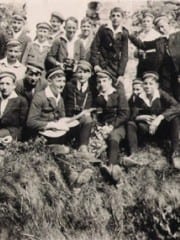
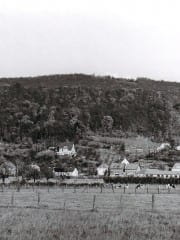
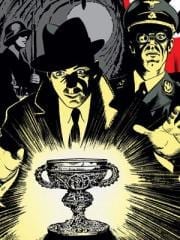

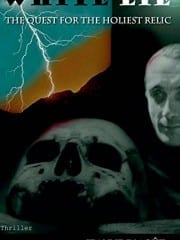
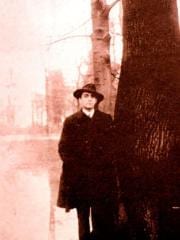

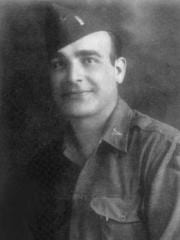
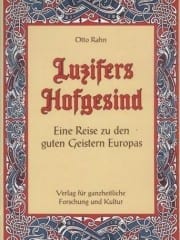
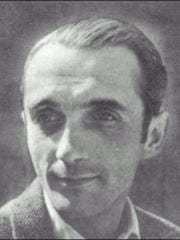
Commentaires récents
il y a 13 années 50 semaines
il y a 13 années 50 semaines
il y a 13 années 50 semaines
il y a 13 années 51 semaines
il y a 14 années 2 semaines
il y a 14 années 7 semaines